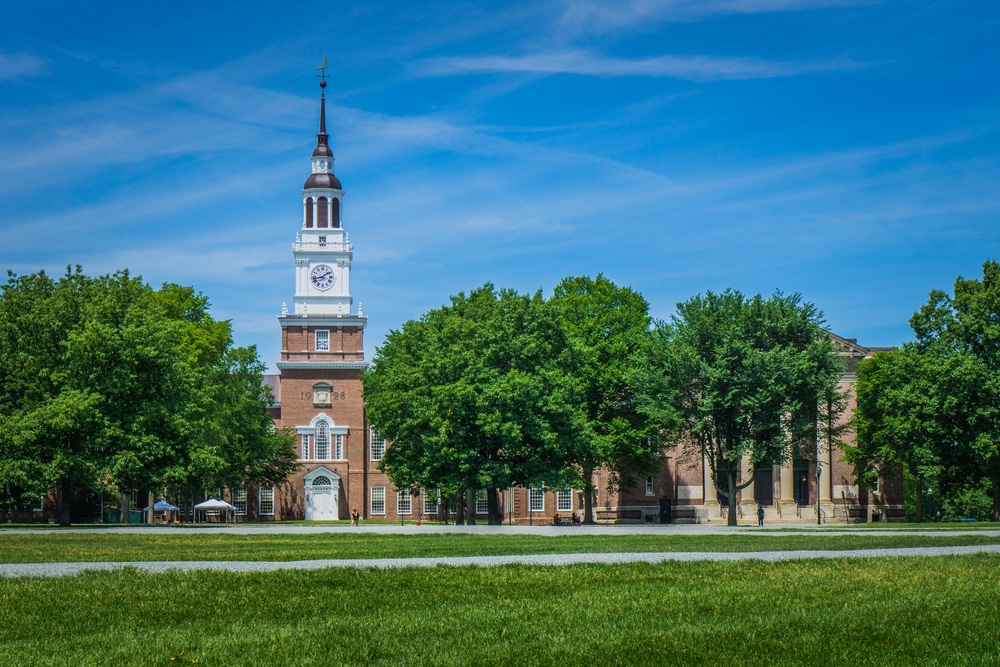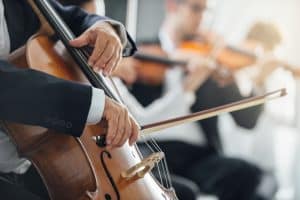Exploring Dartmouth’s Music Program
Undeniably, Dartmouth College has created a name for itself in diverse fields of study. One program that stands out exceptionally is Dartmouth’s music program. This article explores all aspects of Dartmouth College’s music program, providing an in-depth understanding of its history, curriculum, faculty, resources, and the opportunities it offers its students.
Understanding Music at Dartmouth College
Dartmouth College offers a comprehensive music program within the Department of Music. The program is extensively designed for students who have an avid interest in music, whether as performers, composers, or scholars.
With a long and storied history, Dartmouth’s music program has been integral to the college since its early days. Dating back to its establishment, the music program at Dartmouth has a rich and invigorating history. It was in the early days of the college when music was incorporated as a part of the liberal education. The music program was intended to reflect the institution’s long-standing commitment to comprehensive education, which includes an understanding and appreciation of music.
The history of the program is a testament to the college’s dedication to the arts. From its humble beginnings, the program has grown into a renowned center for musical excellence. The program’s early days saw a small group of dedicated faculty members and students coming together to explore the world of music.
Over the years, the program has expanded and evolved significantly, keeping pace with the rapidly changing world of music. Today, the Department of Music at Dartmouth stands as a pioneering institution offering various courses and specializations in music.
As the program gained recognition and support, it began to attract talented musicians from all over the country. The faculty expanded, bringing in renowned musicians and scholars who further enriched the program’s offerings. Their expertise and passion nurtured a vibrant and dynamic musical community within Dartmouth College.
Dartmouth has been a hub of creativity and innovation. It has witnessed the rise of various musical genres and movements, adapting and embracing new forms of expression. The program has always been at the forefront of musical exploration, from classical compositions to jazz improvisations, experimental sounds, and traditional folk music.
The Curriculum of the Dartmouth Music Program
Dartmouth’s music program offers an enriching and wide-ranging curriculum that caters to a variety of musical interests. It covers music’s theoretical and practical aspects, providing students with a well-rounded musical education.
At Dartmouth, the music curriculum is designed to foster creativity, critical thinking, and a deep understanding of music in all its forms. Some courses and specializations will challenge and inspire you whether you are a seasoned musician or just beginning your musical journey.
At Dartmouth, students wishing to major in music must take ten classes. These include courses in creative practice, performance, and musical engagement, as well as the music proseminar. Given that students need to accumulate 35 credits annually, it becomes relatively easy for them to pursue a double major at Dartmouth. Alternatively, one could major solely in music and later decide to add a minor, increasing the total number of music courses taken.
If you’re uncertain about your specialization, Dartmouth offers a plethora of avenues in musical education. The program equips students for diverse careers, whether in academia as a teacher, in the film industry as a composer, or in musicology.
Moreover, students can gain credit from private lessons and participating in ensembles directed by faculty members. Most music majors predominantly focus on honing their abilities in this performative domain.
Overview of the Music Courses
The music curriculum has a wide array of courses that revolve around music theory, performance, history, composition, and more. All levels of musicianship, from beginner to advanced, can find programs tailored to their skill level.
Music theory courses delve into the fundamental principles of music, teaching students how to read and analyze musical notation, understand harmony and counterpoint, and develop a strong foundation in music literacy. Performance studies courses allow students to hone their skills on various instruments or voices, exploring different genres and styles under the guidance of experienced faculty members.
For those interested in the rich history of music, some courses explore different periods and genres, from classical to jazz, from world music to contemporary compositions. These courses provide historical context and encourage students to engage critically with the music they study.
Additionally, the music curriculum at Dartmouth recognizes the importance of technology in the modern music landscape. Computer and electronic music production courses equip students with the skills to create and manipulate sounds using cutting-edge software and hardware.
Specializations within the Music Program
Dartmouth offers several specializations within the music program for those interested in focusing their studies. These specializations provide an in-depth exploration of specific areas of music, equipped with dedicated faculty members and resources.
The performance specialization is designed for students who wish to develop their skills as instrumentalists or vocalists. Through private lessons, ensemble participation, and performance opportunities, students receive individualized instruction and guidance to reach their full potential as performers.
Those with a passion for composition can pursue the composition specialization, where they will learn the art of creating original music. From writing for small ensembles to orchestral compositions, students can work closely with faculty mentors and have their compositions performed by professional musicians.
Ethnomusicology is another specialization offered at Dartmouth, focusing on the study of music in cultural and social contexts. Students in this specialization explore music from different cultures and regions, examining the role of music in society, rituals, and identity formation.
Music cognition is a specialization that delves into the scientific study of how the brain processes and perceives music. Students in this specialization explore topics such as music psychology, neuroscience, and the cognitive processes involved in music listening and performance.
These specializations and others offered by the Department of Music allow students to pursue their specific interests and develop expertise in their chosen field.
Overall, Dartmouth’s music program is committed to nurturing its students’ artistic and intellectual growth. With a diverse curriculum, dedicated faculty, and a vibrant musical community, Dartmouth provides a supportive and inspiring environment for students to explore and excel in the world of music.
Faculty and Staff of Dartmouth’s Department of Music
Dartmouth College’s Department of Music is home to a remarkable group of individuals who are passionate about music education and dedicated to the growth and development of their students. With diverse skills and experiences, the faculty and staff work together to create a vibrant and enriching musical environment.
The professors are at the heart of Dartmouth’s music program, a group of highly accomplished musicians and educators. Each professor brings unique skills and experiences to the program, creating a dynamic and engaging learning environment for students.
Dartmouth’s music program professors cover a broad spectrum of musical genres and styles from classical to jazz and world music to electronic composition. They are dedicated scholars and practicing artists, actively involved in the music community beyond the classroom.
With impressive professional backgrounds encompassing both academic and performance-based experience in music, the professors at Dartmouth’s Department of Music are able to offer students a comprehensive and well-rounded education. They provide guidance and mentorship, helping students develop their musical skills and explore their artistic potential.
Behind the scenes, the support staff of Dartmouth’s music program plays a crucial role in ensuring the program runs smoothly and efficiently. From managing administrative tasks to organizing performances, the support staff works tirelessly to create a supportive and nurturing environment for students.
The support staff also takes care of the logistical aspects of the program, such as maintaining equipment and facilities. They ensure that students have access to state-of-the-art instruments, recording studios, and practice spaces, allowing them to immerse themselves in their musical studies fully.
In addition to their administrative responsibilities, the support staff is committed to assisting students in their academic journey. They provide guidance on course selection, help students navigate the program’s requirements, and offer support and resources for academic success.
Furthermore, the support staff plays a pivotal role in fostering a sense of community within Dartmouth’s music program. They organize events, workshops, and performances that bring together students, faculty, and staff, creating opportunities for collaboration and artistic growth.
Through their dedication and hard work, the support staff ensures that students have the resources and support they need to thrive in Dartmouth’s music program. Their commitment to excellence and passion for music education are invaluable assets to the program.
Ultimately, the Dartmouth Music Program is fortunate to have a talented and dedicated team of faculty and staff. Their expertise, passion, and commitment to music education create a vibrant and nurturing environment for students to explore and develop their musical talents. Whether through the professors’ guidance or the staff’s support, students in Dartmouth’s music program are provided with the tools and opportunities they need to succeed in their musical journey.
Facilities and Resources for Music Students
Dartmouth provides an array of resources and facilities to foster their students’ musical growth. These include music libraries, research resources, practice rooms, state-of-the-art studios, and more.
When it comes to music education, Dartmouth College leaves no stone unturned. The college understands the importance of providing students with a conducive environment that nurtures their musical talents and allows them to explore their passion to the fullest.
Music Studios and Practice Rooms
Music students at Dartmouth have access to a number of equipped studios and practice spaces. These state-of-the-art facilities are designed to meet the needs of every aspiring musician. From soundproof walls to top-notch recording equipment, these studios provide the perfect setting for students to hone their skills.
Collaboration is essential to the music-making process, and Dartmouth recognizes this. The practice rooms are not just individual spaces for students to practice in solitude; they are also designed to encourage collaboration and creativity. Students can unite, share ideas, and create music transcending boundaries.
Libraries and Research Resources
Dartmouth College offers music students extensive libraries and research resources for scholastic undertakings. These libraries are a treasure trove of knowledge, housing an impressive collection of books, journals, and manuscripts on music history, theory, and composition.
Students can immerse themselves in the rich history of music, exploring the works of renowned composers and analyzing the evolution of different genres. The research resources available at Dartmouth provide students with the tools they need to delve deep into the world of music and develop a comprehensive understanding of the subject.
But it doesn’t stop at books and manuscripts. Dartmouth’s music libraries also boast a wide range of audio and visual resources. From recordings of classical symphonies to documentaries on influential musicians, these resources offer a multi-dimensional learning experience for students.
Whether studying the intricacies of a musical composition or analyzing the techniques used in a particular performance, Dartmouth’s music libraries and research resources provide students with the necessary materials to expand their knowledge and enhance their academic growth.
Opportunities Beyond the Classroom
The Dartmouth Music Program doesn’t limit the students’ growth to the confines of a classroom. From organizing performance groups to internships, Dartmouth offers various opportunities to get hands-on experience in the field.
Music Ensembles and Performance Groups
Dartmouth routinely organizes music ensembles and performance groups in different genres of music. Participating in these groups allows students to apply what they’ve learned, collaborate, and perform in front of an audience. The experience gained here is invaluable to their musical and personal development.
Internships and Study Abroad Programs
Dartmouth actively encourages students to participate in internships and study abroad programs. These opportunities expose students to unique cultural perspectives, further stimulating their creativity and understanding of music. Students gain invaluable real-world experience that aids in shaping their musical journey.
In addition, the music department provides access to two distinct study-abroad opportunities. Most students participate in the program based in Vienna, while the other one is in London. In addition, most students who concentrate on music also earn a degree in another field, which frequently supplements their musical training.
In conclusion, Dartmouth’s music program is a nurturing environment for budding musicians, providing a strong foundation for them to launch their musical careers. It provides aspiring musicians with a holistic education, robust resources, and unparalleled opportunities.
If you need help putting the finishing touches on your college applications, at AdmissionSight, we have over 10 years of experience guiding students through the competitive admissions process.
AdmissionSight can help you put your best foot forward when applying to college this fall. Contact us today for more information on our services.








































